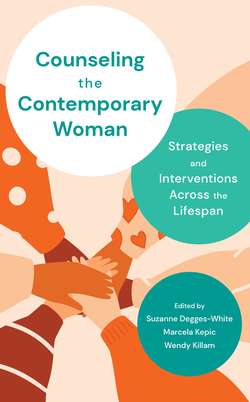Читать книгу Counseling the Contemporary Woman - Suzanne Degges-White - Страница 123
На сайте Литреса книга снята с продажи.
Sexual Relationships
ОглавлениеRegardless of sexual orientation, women acknowledge that their sexual relationships change over time as interest and engagement in sexual behaviors diminish (Paine, Umberson, & Reczek, 2018). Not surprisingly, physical changes as well as changing responsibilities were perceived to contribute to these changes. More specifically, one of the most frequently voiced concerns about menopause is the perceived negative effect that it can have on sexual activity and intimacy. From the United States to Saudi Arabia (Al Mehdar et al., 2017), women express the desire for a more satisfying sex life postmenopause. Hormonal changes can bring about multiple causes of sexual dissatisfaction, including vaginal dryness, compromised arousal and difficulty reaching orgasm, decreased sexual satisfaction, and lower levels of sexual desire (Nappi & Lachowsky, 2009). Clearly, there are multiple challenges that menopausal women face in terms of decreased sexual pleasure.
Although women have been more vocal in expressing their experiences related to sexual activity in middle adulthood, there may be a parallel experience for men. A term coined by Jannini and Nappi (2018), couplepause, was used to describe the shared experience that aging can take on a midlife couple. While a lesbian couple, depending on age, might experience simultaneous menopausal symptoms, it was only recently that researchers acknowledged that a heterosexual couple may also battle waning sex drives and physiological, age-related sexual dysfunction. Menopausal women might experience symptoms such as vaginal dryness, vaginal irritation, and insufficient lubrication, which can all contribute to pain during intercourse. However, as men age, they also experience sexual dysfunctions, including erectile problems and, potentially, testosterone deficiency.
When working with a midlife client who is concerned about her level of sexual attractiveness to her partner or her own sexual performance, counselors can encourage her to discuss her concerns with her sexual partner. If her partner is at a similar developmental stage, it can be normal for both partners to lose interest in sexual activity. Counselors can help normalize this experience, and if a couple-centric focus is employed, it can be a positive support for a client who feels stigmatized for her age or menopausal status. Other relationships, beyond a primary romantic relationship, also may undergo significant changes during this period of life.
